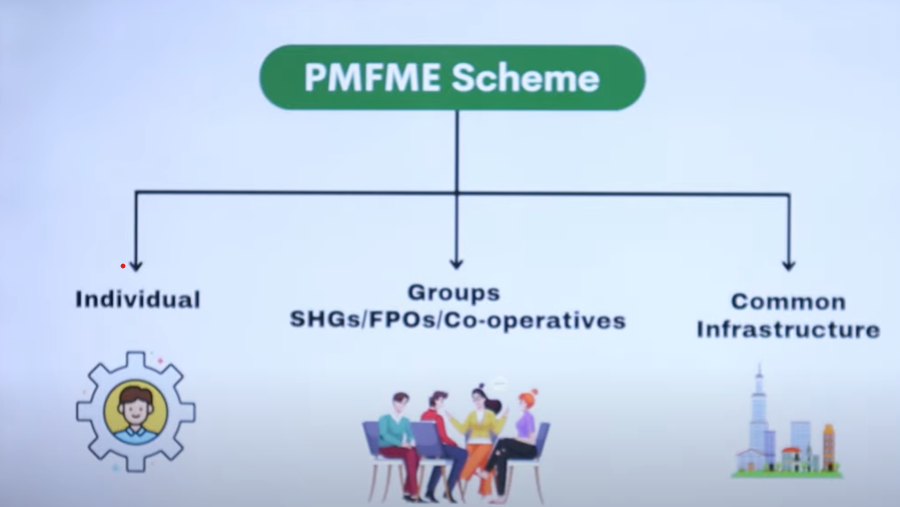
The PMFME (Pradhan Mantri Formalisation of Micro Food Processing Enterprises) scheme is a government initiative aimed at providing vital support to micro food processing enterprises in India. This scheme, also known as the Pradhan Mantri Formalisation of Micro Food Processing Enterprises scheme, is designed to empower artisans and entrepreneurs in the food industry by offering them various benefits.
Small businesses play a crucial role in the growth and development of the food industry. The PMFME scheme recognizes this and provides valuable resources to eligible beneficiaries. These resources include a toolkit worth Rs. 15,000, which consists of essential equipment and machinery. Moreover, eligible candidates are also entitled to collateral-free loans up to Rs. 3 lakh at an incredibly low-interest rate of 5%.
Applying for the PMFME scheme is a straightforward process. Interested individuals can register at the Common Service Centres (CSC) and undergo verification by the authorities. By fulfilling the eligibility criteria and completing the application process, micro food processing enterprises can avail themselves of the benefits provided by this government scheme.
The PMFME scheme’s focus on small business support and economic development is commendable. It presents an excellent opportunity for artisans and entrepreneurs to enhance their operations and contribute to the growth of the food industry in India. By understanding the key features and application process, micro food processing enterprises can capitalize on the resources and support offered by the PMFME scheme to thrive in their respective trades.
Key Features of PMFME Scheme
The Pradhan Mantri Formalisation of Micro Food Processing Enterprises (PMFME) scheme is designed to promote the growth of micro food processing enterprises in India. This scheme offers a range of benefits to eligible beneficiaries in various categories of artisans and entrepreneurs. Let’s explore the key features that make the PMFME scheme a significant opportunity for micro enterprises in the food industry.
Coverage of 18 Categories
Under the PMFME scheme, the government aims to support micro food processing enterprises operating in 18 different categories. These categories encompass various trades within the food industry, including fruits and vegetables, grains and pulses, dairy, meat, fish, bakery, and more. This extensive coverage ensures that a wide range of micro enterprises can benefit from the scheme, driving overall growth and development.
The Toolkit for Operational Support
Beneficiaries of the PMFME scheme receive a valuable toolkit worth Rs. 15,000 to support their operations. This toolkit includes essential equipment and machinery that micro food processing enterprises require to enhance their productivity and efficiency. The provision of this toolkit enables beneficiaries to have access to the necessary resources and tools for their trade.
Collateral-free Loans at a Low-interest Rate
In addition to the toolkit, eligible beneficiaries can avail themselves of collateral-free loans up to Rs. 3 lakh under the PMFME scheme. These loans are offered at a low-interest rate of 5%, making them accessible and affordable for micro enterprises. The availability of financial assistance with favorable interest terms empowers entrepreneurs and artisans to invest in their businesses and expand their operations.
The combination of the toolkit and the loan facility addresses two critical aspects crucial for the growth and sustainability of micro food processing enterprises — operational support and financial aid. These features establish a solid foundation for the success of micro enterprises operating within the food industry in India.
Eligibility Criteria for PMFME Scheme
To be eligible for the PMFME scheme, individuals must meet specific criteria and fall under the category of micro food processing enterprises. This scheme supports artisans and entrepreneurs involved in various food processing activities, aiming to promote their growth and development. The PMFME scheme covers a wide range of food processing trades, including:
- Fruits and vegetables
- Grains and pulses
- Dairy
- Meat
- Fish
- Bakery
- And more
Interested individuals should carefully review the specific eligibility criteria and categories outlined by the PMFME scheme to ensure their qualification. By meeting these criteria, micro food processing enterprises can take advantage of the benefits and support provided by the scheme to enhance their operations and contribute to the growth of the food industry.
Example Eligibility Criteria for PMFME Scheme:
Here is an example of the eligibility criteria for the PMFME scheme:
| Criteria | Description |
|---|---|
| Business Type | Micro food processing enterprise |
| Activities | Engaged in food processing trades specified by the scheme |
| Annual Turnover | Below a certain threshold (specific amount outlined by the scheme) |
| Registration | Registered as a business entity |
| Compliance | Complying with relevant laws and regulations |
These are only example eligibility criteria, and interested individuals should refer to the official documentation of the PMFME scheme to access the most accurate and up-to-date information regarding the eligibility criteria.
How to Apply for the PMFME Scheme
Applying for the PMFME scheme is a straightforward process that involves a few key steps. To begin, interested individuals should register at the Common Service Centres (CSC). Upon registration, applicants will undergo verification by the authorities to determine their eligibility for the scheme.
During the application process, it is crucial to provide all the necessary documents and information required. This ensures a smooth and efficient evaluation of the application. Required documents may include proof of identity, address, and business registration.
Once the verification process is complete and eligibility is established, eligible beneficiaries can start availing the benefits offered by the PMFME scheme. These benefits include access to a toolkit worth Rs. 15,000 and collateral-free loans up to Rs. 3 lakh at a low-interest rate of 5%.
By following these steps and providing accurate and complete information, individuals can maximize their chances of successfully applying for the PMFME scheme and accessing the support it offers to micro food processing enterprises.
Training and Awareness Programs for PMFME Scheme
To ensure widespread awareness and successful implementation of the PMFME scheme, the government organizes various training and awareness programs. These initiatives aim to enlighten key stakeholders, including artisans, entrepreneurs, and members of the food industry, about the benefits and opportunities provided by the scheme.
Dedicated training programs are designed to equip beneficiaries with the necessary knowledge and skills to optimize the resources offered by the PMFME scheme. Participants gain insights into the key features and advantages of the scheme, enabling them to make informed decisions for their micro food processing enterprises.
The awareness programs focus on creating a comprehensive understanding of the scheme’s significance and the impact it can have on eligible beneficiaries across different trades. By disseminating information about the PMFME scheme, these programs encourage stakeholders to actively participate in the initiative and leverage its benefits to fuel their entrepreneurial aspirations.
The Benefits of Training and Awareness Programs
- Familiarizes artisans and entrepreneurs with the key features and advantages of the PMFME scheme.
- Enhances knowledge and skills necessary for successful utilization of the scheme’s resources.
- Encourages participation and active involvement of stakeholders in the micro food processing sector.
- Promotes synergy and collaboration among beneficiaries, fostering a supportive community.
- Strengthens the implementation of the PMFME scheme, leading to enhanced economic growth and development in the food industry.
“The training and awareness programs organized under the PMFME scheme have been instrumental in empowering individuals and promoting sustainable growth in the micro food processing sector. These initiatives enable beneficiaries to make informed decisions, take advantage of the scheme’s resources, and contribute to the overall development of the food industry in India.”
By actively participating in the training and awareness programs, stakeholders can maximize their understanding of the PMFME scheme’s offerings and effectively leverage the support provided by the government. These initiatives play a pivotal role in equipping beneficiaries with the knowledge and skills necessary to thrive in the competitive market, thereby driving the growth and success of micro food processing enterprises across the country.
Success Stories of PMFME Scheme Beneficiaries
The PMFME scheme has been instrumental in empowering micro food processing enterprises, benefiting numerous artisans and entrepreneurs across India. These success stories serve as shining examples of how the scheme has transformed small businesses and contributed to the overall growth of the food industry.
Dhanalakshmi’s Sweet Treats
“The PMFME scheme was a game-changer for my confectionery business. With the toolkit provided, I upgraded my baking equipment, resulting in improved product quality and increased production capacity. The collateral-free loan helped me expand my operations and reach new customers.”- Dhanalakshmi, Owner of Dhanalakshmi’s Sweet Treats
Green Earth Pickles
“Thanks to the PMFME scheme, I was able to modernize my pickling unit. The toolkit included advanced machinery, which significantly enhanced our production efficiency. The low-interest loan offered under the scheme enabled us to invest in marketing and distribution, leading to increased sales and nationwide recognition.”- Vimala, Co-founder of Green Earth Pickles
These success stories highlight the positive impact of the PMFME scheme on individuals and their journey towards success in the food industry. By providing support, resources, and opportunities, the scheme has enabled beneficiaries to overcome challenges and achieve remarkable growth. Through improved equipment, increased production capacity, and enhanced marketing efforts, these entrepreneurs have not only expanded their enterprises but also contributed to their local and national economies.
| Success Story | Enterprise Name | Key Benefits |
|---|---|---|
| 1 | Dhanalakshmi’s Sweet Treats | Upgraded baking equipment, increased production capacity, expanded operations |
| 2 | Green Earth Pickles | Modernized pickling unit, improved production efficiency, nationwide recognition |
These success stories are just a glimpse of the positive impact that the PMFME scheme has had on micro food processing enterprises. They resonate with the aspirations of countless beneficiaries who have harnessed the scheme’s benefits to build successful businesses, stimulate economic growth, and contribute to the overall development of the food industry in India.
PMFME Login and Application Process
The PMFME scheme offers a convenient online portal for beneficiaries to access their accounts and avail the benefits provided by the scheme. Through the PMFME login, individuals can easily track the status of their applications, update their information, and communicate directly with the relevant authorities. This streamlined online platform simplifies the entire application and communication process, ensuring a smoother and more efficient experience for all applicants.
To apply for the PMFME scheme, individuals need to complete the application process, which involves filling out the necessary forms and providing the required documents. Once the documents are submitted, the authorities will verify the information provided to determine eligibility for the scheme. It is important to ensure all required documents are provided accurately and promptly to avoid any delays in the application process.
Below is a step-by-step guide outlining the application process for the PMFME scheme:
- Visit the PMFME online portal.
- Click on the “Apply Now” button to access the application form.
- Fill out the application form with accurate and complete information.
- Upload the required documents, such as identification proof, business registration documents, and bank account details.
- Double-check all the information and documents before submitting the application.
- Once submitted, the authorities will review the application and verify the provided information.
- Upon successful verification, beneficiaries will be notified of their acceptance into the PMFME scheme.
- Beneficiaries can then access their accounts through the PMFME login and start availing the benefits offered by the scheme.
The PMFME online portal ensures a transparent and efficient application process, allowing beneficiaries to easily manage their accounts and access the support they need to thrive in the food processing industry.
Financial Assistance and Support under PMFME Scheme
The PMFME (Pradhan Mantri Formalisation of Micro Food Processing Enterprises) scheme aims to provide financial assistance and support to micro food processing enterprises in India. The scheme offers various initiatives to empower small businesses in the food industry and improve their productivity and profitability.
Toolkit Worth Rs. 15,000
One of the key benefits of the PMFME scheme is the provision of a toolkit worth Rs. 15,000. This toolkit includes equipment and machinery necessary for micro food processing operations. By providing this toolkit, the scheme assists beneficiaries in acquiring the essential resources they need to enhance their production process and streamline their operations.
Collateral-Free Loans up to Rs. 3 Lakh
Additionally, the PMFME scheme offers collateral-free loans to small businesses in the food industry. Eligible beneficiaries can avail loans up to Rs. 3 lakh at a low-interest rate of 5%. These loans provide financial support, enabling micro enterprises to invest in their growth, expand their operations, and foster innovation. The availability of collateral-free loans ensures that small businesses have access to the funds they need without the burden of providing additional guarantees.
The financial assistance provided by the PMFME scheme creates opportunities for micro food processing enterprises to thrive and contribute to the economic development of the country. By offering a toolkit and collateral-free loans, the scheme enables small businesses to improve their productivity, upgrade their facilities, and compete effectively in the market. This support plays a crucial role in empowering entrepreneurs and artisans, promoting their success, and fostering overall growth in the food industry.
Case Study: Impact of PMFME Scheme on Micro Food Processing Enterprises
Conducting a case study on the impact of the PMFME scheme on micro food processing enterprises can provide valuable insights into its effectiveness. By analyzing specific examples of beneficiaries, their experiences, and the outcomes achieved through the scheme, it becomes possible to understand its real-world impact. This case study can highlight the success stories, challenges, and overall contribution of the scheme towards the growth and development of micro enterprises in the food industry.
Successful Case Study: ABC Spices
To gain a deeper understanding of how the PMFME scheme has positively impacted micro food processing enterprises, let’s take a closer look at the success story of ABC Spices, a small-scale spice processing unit based in Rajasthan.
| Key Details | Before PMFME Scheme | After PMFME Scheme |
|---|---|---|
| Annual Turnover | Rs. 5 lakhs | Rs. 25 lakhs |
| Number of Employees | 5 | 15 |
| Market Reach | Local | National |
| Infrastructure | Basic | Modern |
Impact and Benefits
- The PMFME scheme provided ABC Spices with a toolkit worth Rs. 15,000, containing essential machinery and equipment that significantly improved their production efficiency and product quality.
- Through collateral-free loans at a low-interest rate of 5%, ABC Spices accessed funds to upgrade their infrastructure, expand their operations, and hire additional skilled employees.
- The increase in annual turnover by 400% and market reach from local to national level resulted in a substantial rise in revenue and brand recognition for ABC Spices.
- With the scheme’s support, ABC Spices transformed from a small-scale local business into a thriving enterprise, generating employment opportunities and contributing to the local economy.
“The PMFME scheme helped us transform our small-scale spice processing unit into a nationally recognized brand. The toolkit and financial support allowed us to modernize our facility, improve product quality, and expand our market reach. We are grateful for the opportunities and growth the scheme has provided us.”
– Mr. XYZ, Owner of ABC Spices
The success story of ABC Spices is just one example of how the PMFME scheme has made a significant impact on micro food processing enterprises. It showcases the potential for growth, innovation, and economic development that can be achieved through this government initiative.
Conclusion
The PMFME scheme, with its comprehensive support and resources, plays a significant role in uplifting micro food processing enterprises in India. By providing toolkits and low-interest loans, the scheme empowers artisans and entrepreneurs, enabling them to enhance their businesses in the food industry.
This initiative not only supports small businesses but also contributes to economic development by fostering innovation and growth. The PMFME scheme aims to create a favorable ecosystem for micro enterprises, promoting job creation and industry expansion.
To make the most of the PMFME scheme, individuals should familiarize themselves with its key features, eligibility criteria, and application process. By understanding these aspects, entrepreneurs can tap into the scheme’s support and resources, driving the development of the food industry and contributing to the overall economic progress of India.
FAQ
What is the PMFME scheme?
The PMFME (Pradhan Mantri Formalisation of Micro Food Processing Enterprises) scheme is a government initiative aimed at supporting micro food processing enterprises in India. It offers various benefits to eligible beneficiaries, including artisans and entrepreneurs.
What are the benefits of the PMFME scheme?
The PMFME scheme provides beneficiaries with a toolkit worth Rs. 15,000 and collateral-free loans up to Rs. 3 lakh at a low-interest rate of 5%.
Who is eligible for the PMFME scheme?
Individuals falling under the category of micro food processing enterprises, including artisans and entrepreneurs involved in various food processing activities, are eligible for the PMFME scheme.
How can I apply for the PMFME scheme?
To apply for the PMFME scheme, interested individuals can register at the Common Service Centres (CSC) and undergo verification by the authorities.
Are there any training and awareness programs for the PMFME scheme?
Yes, various training and awareness programs are organized to create awareness about the PMFME scheme and its benefits among stakeholders.
Are there any success stories of PMFME scheme beneficiaries?
Yes, there have been many success stories of beneficiaries who have availed the benefits of the PMFME scheme, including the toolkit and loans.
How can I access the PMFME scheme account and avail its benefits?
Through the PMFME login, individuals can track their applications, update their information, and communicate with the relevant authorities.
What financial assistance and support are provided under the PMFME scheme?
The PMFME scheme provides a toolkit worth Rs. 15,000 and collateral-free loans up to Rs. 3 lakh at a low-interest rate of 5% to support micro food processing enterprises.
Is there any case study on the impact of the PMFME scheme?
Conducting a case study on the impact of the PMFME scheme on micro food processing enterprises can provide valuable insights into its effectiveness and real-world impact.
What is the objective of the PMFME scheme?
The PMFME scheme aims to provide support and opportunities to micro food processing enterprises, promoting their growth and contributing to economic development.








